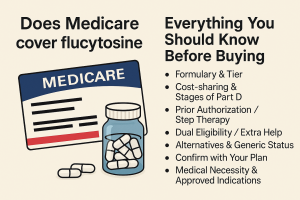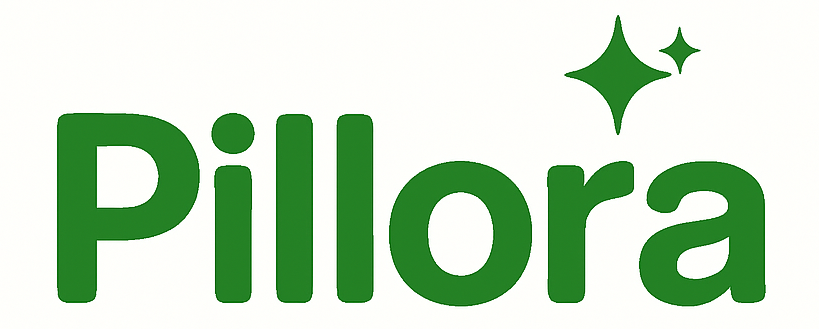Does Medicare cover flucytosine

What is flucytosine?
Flucytosine is a prescription (Rx) antifungal medicine used with other agents to treat serious fungal infections such as cryptococcal meningitis and systemic candidiasis. If you’re asking, does Medicare cover flucytosine, the short answer is that coverage typically falls under Medicare Part D (or Medicare Advantage plans with drug benefits), but exact costs depend on your specific plan’s formulary, tier, and any prior-authorization rules.
Benefits
- Targets susceptible fungal organisms when combined with other antifungals as directed by your clinician.
- Oral dosage form allows systemic therapy without IV access in appropriate cases.
- Established clinical role in induction/combination regimens for severe infections.
Because treatment courses can be lengthy, knowing in advance does Medicare cover flucytosine helps you budget for copays and avoid therapy interruptions.
Dosage & Usage
Use exactly as prescribed. Dosing is weight-based and commonly divided into multiple daily doses, often combined with another antifungal. Your prescriber may monitor blood counts and drug levels. Never adjust, skip, or stop therapy without medical advice.
Take with or without food at the same times daily. If you miss a dose, take it soon unless it’s close to the next dose—do not double up.
Storage
Store at room temperature away from moisture and heat. Keep tightly closed and out of reach of children and pets. Do not use past the labeled expiration date.
Product Information
- Generic name: Flucytosine
- Class: Antimetabolite antifungal
- Prescription status: Rx
- Typical use: In combination regimens for invasive yeast/cryptococcal infections
How It Works
Flucytosine enters fungal cells and is converted to 5-fluorouracil (5-FU), which disrupts nucleic-acid synthesis and protein production. This selective action weakens the pathogen so companion antifungals can clear infection more effectively.
Who Should Use
Adults and sometimes adolescents with confirmed susceptible systemic fungal infections may be candidates, strictly under specialist supervision. Patients with kidney dysfunction or bone-marrow suppression require close monitoring and may need dose adjustments.
Buying Online
If you’re comparing costs and wondering does Medicare cover flucytosine, check your plan’s 2025 drug list (formulary), tier placement, and any prior authorization. Costs vary by deductible stage and pharmacy network. Mail-order can sometimes reduce copays; ensure the pharmacy is in-network and U.S.-based for Medicare claims.
Looking for supportive items? Explore related essentials from our store:
- Econazole Nitrate Vaginal Ovules 150mg (Ecorex®)
- Cetaphil, Moisturizing Cream, Fragrance Free, 3 oz
- Vitamin D3 – 1000IU
Tip: If your plan doesn’t list flucytosine, ask your prescriber about a formulary exception and confirm any monitoring labs are covered under Part B.
Safety & Possible Side Effects
Common: nausea, vomiting, diarrhea, rash, headache. Serious: bone-marrow suppression (low white cells/platelets), liver toxicity, kidney issues, severe skin reactions. Seek urgent care for fever, unusual bleeding/bruising, jaundice, or severe fatigue. Discuss all medicines and supplements with your clinician to avoid interactions. Use in pregnancy or breastfeeding only if clearly needed and directed by your doctor.
FAQs
Q: Does Medicare cover flucytosine?
A: Coverage is usually through Part D/Medicare Advantage drug plans. Check your plan’s formulary, tier, and prior-authorization rules for your exact copay.
Q: Can I use coupons with Medicare?
A: Manufacturer/third-party coupons generally can’t be combined with Medicare claims. Ask your pharmacist about plan-preferred pharmacies or mail-order pricing.
Q: How long will I need therapy?
A: Duration varies by infection type and response; follow your specialist’s plan and lab monitoring schedule.




















